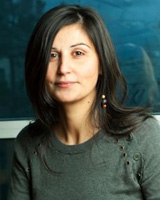Teresa Proto, born in Formia, Italy, in 1977. Ph.D. from the University of Siena. Postdoctoral researcher of Linguistics and Germanic Philology.
EURIAS Junior Fellow (1 September 2013 – 30 June 2014)
MUSIC-LANGUAGE INTERACTION IN VOCAL MUSIC
Research Question
What are the rules that govern the alignment of prosodic units (stress, pitch accent, vowel length) with musical structures (downbeats, phenomenal accents, duration) in vocal music? Can evidence from empirical studies of text-setting across languages and musical idioms help us achieve insights into two closely interrelated areas of human ability, i.e. language and music?
Project Description
It is generally assumed that the alignment of a text to a tune in vocal music is not a random process, but one that is governed by a set of rules that may vary from language to language, and possibly from one singing idiom to another within the same language. As a matter of fact, when lyrics are set to music, syllables are assigned to musical pitches in such a way as to conform to specific requirements of the language. My project represents a tiny step towards understanding how the coordination of the musical and linguistic competence actually takes place when setting a text to a tune. It will focus on two distinct singing idioms based on languages that are typologically different: the German Volkslieder and the songs of the Bamileke of Cameroon.
Selected Publications
1) Proto, T. / Dell, F. (2013) “The structure of metrical patterns in tunes and in literary verse. Evidence from discrepancies between musical and linguistic rhythm in Italian songs”. Probus – An International Journal of Latin and Romance Linguistics 25(1), 105-138 (selected for 25th anniversary issue).
2) Proto, T. (2013) “Prominence matching in English songs: a historical perspective”. Signa. Revista de la Asociación Española de Semiótica 22, 81-104 (invited paper).
3) Proto, T. (2011) “Against an isochronous interpretation of the Nibelungen meter”. In Ch. Küper (ed.), Current Trends in Metrical Analysis. Frankfurt a. M./Berlin/Bern/Bruxelles/New York/Oxford/Wien: Peter Lang, 291-305.
